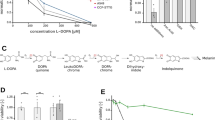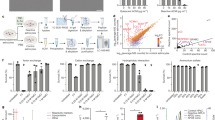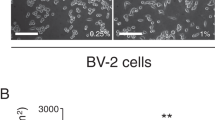Abstract
THE cytolytic and solubilizing actions of lysolecithin added to nervous tissue have been examined fairly extensively in this laboratory during the past eight years. The results of this work were comprehensively reviewed recently by Thompson1, and discussed with regard to their possible relevance to demyelinating processes. It is now established that small amounts of lysolecithin are normally present in fresh nervous tissue2–5. Moreover, both phospholipase A and B and a lysolecithin-acylating system requiring coenzyme A and ATP are also known to be present in brain1,6. It seemed important therefore to determine next whether any derangement of these enzyme systems, such as might occur in brain tissue exposed to anoxia, would lead to the accumulation of lysolecithin, which in turn could cause further damage to membrane structures in the tissue.
This is a preview of subscription content, access via your institution
Access options
Subscribe to this journal
Receive 51 print issues and online access
$199.00 per year
only $3.90 per issue
Buy this article
- Purchase on Springer Link
- Instant access to full article PDF
Prices may be subject to local taxes which are calculated during checkout
Similar content being viewed by others
References
Thompson, R. H. S., in Metabolism and Physiological Significance of Lipids, edit. by Dawson, R. M. C., and Rhodes, D. N., 541 (John Wiley and Son. Ltd., London, 1964).
Thompson, R. H. S., Niemiro, R., and Webster, G. R., Biochim. Biophys. Acta, 43, 142 (1960).
Webster, G. R., and Thompson, R. H. S., Biochim. Biophys. Acta, 63, 38 (1962).
Papadopoulos, N. M., Cevallos, W., and Hess, W. C., Arch. Neurol., 3, 677 (1960).
Blomstrand, R., and Nikayama, F., J. Neurochem., 8, 230 (1961).
Webster, G. R., Biochim. Biophys. Acta (in the press).
Sanders, H., Biochim. Biophys. Acta (in the press).
Papadopoulos, N. M., Arch. Neurol., 8, 340 (1963).
Lands, W. E. M., J. Biol. Chem., 235, 2233 (1960).
Baker, R. W. R., Thompson, R. H. S., and Zilkha, K. J., Lancet, i, 26 (1963).
Baker, R. W. R., Thompson, R. H. S., and Zilkha, K. J., J. Neurol. Neurosurg. Psychiat., 27, 408 (1964).
Baker, R. W. R., Thompson, R. H. S., and Zilkha, K. J., J. Neurol. Neurosurg. Psychiat. (in the press).
Johnson, A. C., McNabb, A. R., and Rossiter, R. J., Canad. J. Res., E, 27, 63 (1949).
Tyrrell, L. W., Nature, 166, 310 (1950).
Gallai-Hatchard, J., Magee, W. L., Thompson, R. H. S., and Webster, G. R., J. Neurochem., 9, 545 (1962).
Ansell, G. B., and Spanner, S., Biochem. J., 94, 252 (1965).
Author information
Authors and Affiliations
Rights and permissions
About this article
Cite this article
WEBSTER, G., THOMPSON, R. Accumulation of Lysolecithin in Rat Brain on Incubation in vitro. Nature 206, 296–297 (1965). https://doi.org/10.1038/206296a0
Issue Date:
DOI: https://doi.org/10.1038/206296a0
This article is cited by
-
Anoxia-induced production of methylated and free fatty acids in retina, cerebral cortex, and white matter
Neurochemical Pathology (1983)
-
Effect of phospholipase a upon brain cholesterol ester formation
Lipids (1974)
-
Fine structural localization of exudated protein tracers in the brain
Acta Neuropathologica (1970)
Comments
By submitting a comment you agree to abide by our Terms and Community Guidelines. If you find something abusive or that does not comply with our terms or guidelines please flag it as inappropriate.



